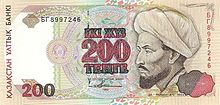Al-Farabi
| Al-Farabi | |
|---|---|

| |
| Persona informo | |
| Naskiĝo | 872 en Otrar |
| Morto | 12-an de januaro 951 en Damasko |
| Lingvoj | araba • persa • sogda |
| Ŝtataneco | Abasida Kaliflando |
| Okupo | |
| Okupo | filozofo logikisto astronomo muzika teoriisto fizikisto socisciencisto |
| Verkoj | Ara Ahl al Madina al Fadila message in the mind Alfarabi's Philosophy of Plato and Aristotle Kitab al-Musiqa al-Kabir |

Al-Farabi (turke Farabi, arabe ابو نصر محمد بن محمد الفارابي Abū Naṣr Muḥammad ibn Muḥammad Al Fārābī;[1] por aliaj registritaj variantoj de lia nomo vidu sube), konata en Okcidenta mondo kiel Alfarabius[2] aŭ Alfarabio (ĉ. 872[3] en Farab aŭ Otrar (nuntempa Kazaĥio)[4] – inter 14a de Decembro, 950 kaj 12a de Januaro, 951 en Damasko),[4] estis fama Turka filozofo kaj juristo kiu verkis en la fakoj de politika filozofio, metafiziko, etiko kaj logiko. Li estis ankaŭ sciencisto, kosmologo, matematikisto kaj muzika fakulo.[5]
En araba filozofia tradicio, li estis konata laŭ la honora titolo "la Dua Majstro", post Aristotelo.[6] Li estis konsiderata kiel konservinto de originaj greklingvaj tekstoj dum la Mezepoko pro siaj komentarioj kaj traktaĵoj, kaj influo super multaj elstaraj filozofoj, kiaj Aviceno kaj Maimonido. Pere de siaj verkoj, li iĝis bone konata kaj en Oriento kaj en Okcidento.
Poligloto
[redakti | redakti fonton]Estus legendo laŭ kiu Al-Farabi estus poligloto kiu scipovus 70 lingvojn[1].
Vidu ankaŭ
[redakti | redakti fonton]Referencoj
[redakti | redakti fonton]- ↑ 1,0 1,1 . Farabi. Encyclopædia Iranica. Alirita April 4, 2010.
- ↑ Alternativaj nomoj kaj tradukoj el araba estas la jenaj: Alfarabi, Farabi, Avenassar, kaj Abunaser.
- ↑ Corbin, Henry. (2001) History of Islamic Philosophy. Kegan Paul. ISBN 978-0-7103-0416-2.
- ↑ 4,0 4,1 “Fārābī: Abū Naṣr Muḥammad ibn Muḥammad ibn Tarkhān al‐Fārābī”, The Biographical Encyclopedia of Astronomers. (PDF version)
- ↑ Ludwig W. Adamec (2009), Historical Dictionary of Islam, pp.95-96. Scarecrow Press. ISBN 0810861615.
- ↑ López-Farjeat, Luis Xavier. "Al-Farabi's Psychology and Epistemology". Stanford Encyclopedia of Philosophy. [1] Alirita la 15an de Novembro 2016.
Text is available under the CC BY-SA 4.0 license; additional terms may apply.
Images, videos and audio are available under their respective licenses.


